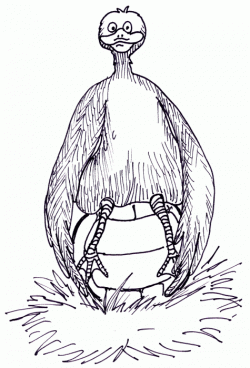Super stimuli: Odd obsessions explain obesity, war
Q. Why did Dutch Nobel laureate Niko Tinbergen paint dummy eggs black with Day-Glo blue polka dots to fool songbirds into thinking they were the real thing? –P. Picasso
A. In the 1930s, he discovered that birds that lay small pale-blue eggs speckled with gray would abandon them to sit on giant black-and-blue counterfeit eggs, so big the birds constantly slid off and had to hop back on, says Deidre Barrett in Supernormal Stimuli.
Tinbergen coined "supernormal stimuli" for these imitations that appeal to instincts and exert a stronger attraction than the real thing. He did a similar experiment with grayleg geese and found that they ignored their own eggs while making "a heroic attempt" to roll a volleyball back into their nest!
Clearly, these hard-wired preferences pose a danger to a species' survival, and humans are no exception, says Barrett. Supernormal stimuli are the driving force behind such pressing societal problems as obesity, addiction to TV and video games, and the past century's violent wars. These imitations have wrought havoc on how we nurture our children, feed our bodies, make love and war. Yet we have one stupendous advantage over Tinbergen's birds: a giant brain that can exercise understanding and self-control to override those instincts and "extricate ourselves from civilization's gaudy traps."
Q. Why can't I work on my suntan just by sitting near the window? –G. Hamilton
A. That "glow of good health" after a day outdoors is the rosy look painted by powerful ultraviolet (UV) energy, says astronomer Bob Berman in The Sun's Heartbeat. About 1 percent of the light hitting a sunbather is UV, which translates into a million trillion photons per second, all, alas, capable of hiking the risk of skin cancer. Even sitting in the shade won't block all UV because of light-scattering effects, so it comes at you sideways.
A hazy humid day, however, screens away half the incoming UV, increasing time needed to tan. A cotton shirt, no matter how ugly, blocks 90 percent of the harmful rays. And window glass (single-pane) does the same, transmitting just 12 percent of UV; make that even less for a standard double-pane.
"If you tan in one hour outdoors, it will take 15 hours behind a typical window, a futile activity," concludes Berman.
Q. Someone once said that "folks who grew up speaking English should be committed to an asylum for the verbally insane." Explain, please. –R. Hingeley
A. Let's face it, English is a crazy language. There is no egg in eggplant nor ham in hamburger; neither apple nor pine in pineapple. English muffins weren't invented in England, and a guinea pig is neither from Guinea nor is it a pig. Oddly, we find that quicksand can work slowly and boxing rings are square, that you can make amends but not one amend. And if you have some odds and ends and get rid of all but one of them, what do you call it? If a vegetarian eats vegetables, what does a humanitarian eat?
In what other language do people recite at a play and play at a recital? Ship by truck and send cargo by ship? Have noses that run and feet that smell? (Adapted from wordaholic Richard Lederer and from the Writing Center of Central Washington University)
Indeed, you have to marvel at the "unique lunacy" of a language where your house can burn up as it burns down, you fill in a form by filling it out, and an alarm goes off by going on. How can a slim chance and a fat chance be the same, while a wise man and a wise guy are opposites? And if Dad is Pop, how's come Mom isn't Mop?
~
Send Strange questions to brothers Bill and Rich at [email protected]
